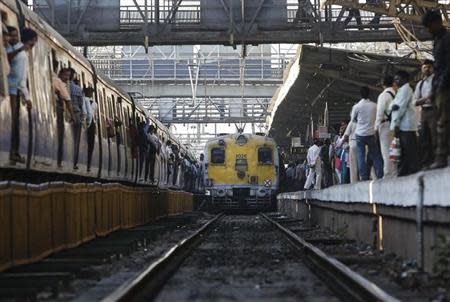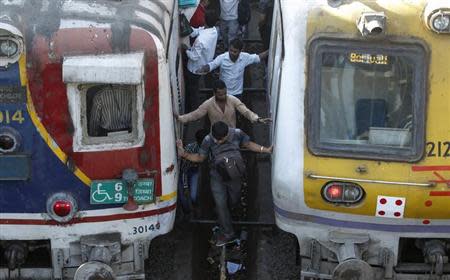Fares, freight rates on hold in rail budget ahead of polls
By Manoj Kumar and Nigam Prusty NEW DELHI (Reuters) - India left train fares and freight rates unchanged in its interim railway budget, as politicians try to please voters and manufacturing companies ahead of national elections due in the next three months. India's state-owned railways are the world's fourth-largest, with 65,000 km (40,000 miles) of track, after the United States, China and Russia, but have suffered from years of low investment and a lack of policy reforms. India last raised passenger fares in January 2013, after a nine-year gap, snapping a populist trend in order to mend the finances of a creaky rail network that drags on the economy. Railways Minister Mallikarjun Kharge said the department would rely on budgetary support as well as market borrowing to invest in new tracks. "Inadequacy of financial resources is a key constraint to railways," he said, while presenting an interim budget for the first four months of the fiscal year to March 2015. Indian Railways plans to invest 643.05 billion rupees on new lines and other infrastructure in the next fiscal year, up 8.3 percent from a revised figure of 593.6 billion in the current fiscal year, he said. It expects support to the tune of 302.23 billion rupees from the federal government's budget, and plans to borrow about 198 billion from the market. Annual gross tariff receipts are projected to grow 14.4 percent to reach 1.6 trillion rupees in the next fiscal year, while working expenses are expected to rise 14 percent to 1.1 trillion. In election years, India presents an interim budget to seek parliament's approval for planned expenditure for a few months, but leaves the next government to take major policy steps in the full-year budget after the polls. The railway budget precedes the federal interim budget, to be presented in parliament by Finance Minister P. Chidambaram on February 17, which is likely to raise funding for some vote-winning projects while trying to rein in the fiscal deficit. In a bid to please voters, the railways minister announced 72 new trains, despite the financial woes that beset the sector. Successive governments have milked the railways to provide voters with cheaper transport and employment. The railways spends about $4 billion on passenger subsidy each year while charging higher freight tariffs. In the past five years, it has added about 260,000 staff to rank among the world's largest employers, with a work force of nearly 1.4 million. The railways remain India's chief mode of long-distance travel, despite a poor safety record of more than 2,200 deaths in railway accidents in the last decade. FOREIGN INVESTMENT Kharge said the government was considering a proposal to allow foreign direct investment in a bid to free up bottlenecks. Once cleared by the federal cabinet, the measure would let foreign investors fully own new passenger services in suburban areas, high speed tracks, and connections to ports, mines and power installations. But it will not open existing passenger and freight networks to foreign investors. India added just 1,750 km (1,087 miles) of new lines during the period from 2006 to 2011, compared with 14,000 km (8,699 miles) by China, auditors Ernst & Young said in a report. (Additional reporting by Rajesh Kumar Singh; Editing by Sanjeev Miglani and Clarence Fernandez)

 Yahoo Finance
Yahoo Finance 



